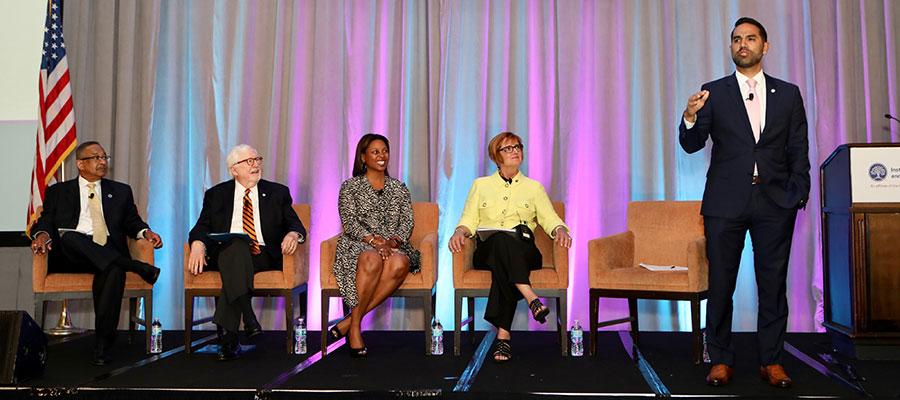Diversity Trailblazers Discuss Progress on Efforts to Accelerate Diversity, Inclusion and Health Equity

Representatives from organizations that have helped lead the national charge on diversity and inclusiveness in health care recently reflected on how their organizations have evolved and the role they have played in these efforts.
At last month’s Institute for Diversity and Health Equity National Leadership & Education Conference in Chicago, Institute Chairman Nicholas Tejeda, market CEO of The Hospitals of Providence in El Paso, Texas, moderated a panel discussion featuring leaders from the Institute, American College of Healthcare Executives, National Association of Health Services Executives and Catholic Health Association of the United States.
A 1992 study found that minorities represented more than 20 percent of hospital employees but held less than 1 percent of top management positions. It also disclosed that African-American health care executives made less money, held lower positions, and had less job satisfaction than their white counterparts. That study was the impetus for the American Hospital Association, ACHE and NAHSE, to unite and create the Institute for Diversity in Health Management. Since its founding, the Institute gained CHA as a partner, and this year the organization was renamed the Institute for Diversity and Health Equity.
Fred Hobby, past president and CEO of the Institute, said he faced a “different environment” when he began his 10-year tenure with the organization in 2005. Too often leaders would get caught up in issues with nomenclature, he said.
“People didn’t like the word diversity,” he said.
Hobby pointed out that there are now more people of color in health care’s C-suite than ever before, citing a joint ACHE and NAHSE study. The field also has seen “a proliferation” of chief diversity officers, he said.
“I like to call them the conscience of the organization,” Hobby said. “They’re the ones who sit at the table and have the arduous task of convincing senior management that embracing diversity, addressing disparities, eliminating disparities, [and] creating equity is not only the right thing to do, but it’s a good business strategy.”
Deborah Bowen, ACHE president and CEO, said her organization has a history of “doing the right thing,” although “there is so much more work to do.”
Bowen recalled how, in 2013, some ACHE staff resigned when the organization created a policy statement that was inclusive of the LGBTQ population.
“As a leadership organization, it’s important to stand for things, and not everybody is going to agree with you,” she said.
Richelle Webb-Dixon, president of the National Association of Health Services Executives, spoke about the organization’s two-fold mission to uplift African Americans’ pursuit of health care leadership, and to help marginalized communities access care.
“I can honestly say: 50 years later, we are holding onto that mission,” she said.
Webb-Dixon recalled how NAHSE was born out of the country’s first civil rights movement, and that the organization today once again finds itself in a pivotal time.
“Unfortunately, in 2018 it feels like we’re going through the civil rights movement again,” Webb-Dixon said. “What are those lessons learned, and what can we do better? How can we build upon the movement that started so long ago, that has unfortunately come back around for us again?”
She also encouraged attendees to remain open-minded in supporting future generations of leadership. Executives who have struggled may think that younger generations must “pay their dues” as they had, Webb-Dixon said. She shared an example of an ambitious young leader whose older counterparts discouraged her progress because they felt she lacked experience.
“Sometimes there’s a voice that needs to be heard, and you don’t have to go through the same pathways the rest of us have gone through,” Webb-Dixon said. “Yes, [younger leaders are] interested; yes they’re engaged, but we need to make sure we’re supporting them.”
Michael Rodgers, senior vice president of CHA, described the nuns who started the 100-year-old institution as being the “first pioneers to address social determinants of health” as they sought to connect with, educate and protect various populations, such as Native Americans, orphans and other vulnerable groups.
CHA has long been committed to diversity, Rodgers said, noting that the topic is “a constant discussion.”

